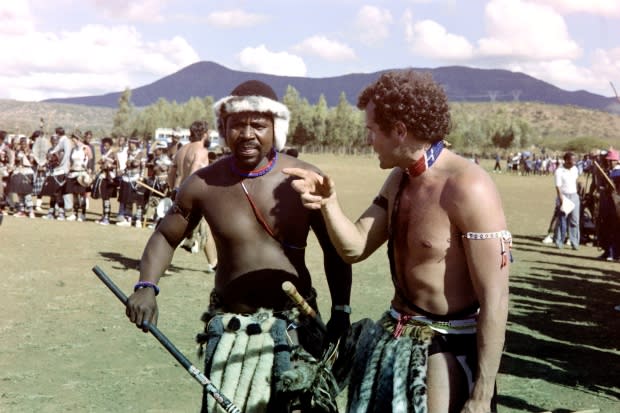South African musician, activist Johnny Clegg dead at 66
Musician and activist Johnny Clegg — known for playing his music in defiance of the apartheid policies of South Africa — died Tuesday at 66 after a four-year battle with pancreatic cancer.
Clegg formed the multiracial bands Juluka and Savuka in South Africa in the 1970s and '80s, respectively, during the country's white-minority rule. His performances and music, influenced by Zulu and folk harmonies, gained him international renown and the nickname "White Zulu."
Clegg's bands and cross-cultural style were seen as symbols of unity and defiance against apartheid.
Born in England, Clegg's family settled in Johannesburg, where he was exposed to Zulu music and dance at an early age. Much of what he learned was eventually incorporated into his own music and performances.
"I was a lot more open to the other South Africa that most white kids were not open to," Clegg said in a 2017 interview with CBC News's Day 6.
"This was a unique genre of guitar, African guitar music, coming from South Africa. I knew that nobody in the white world particularly knew about it."

It was through dance that Clegg met Sipho Mchunu, a Zulu musician and singer who became one of his longest musical collaborators. Together, they formed the duo Juluka (Zulu for "sweat").
Their collaboration broke apartheid laws so they performed in secret at private halls, universities and churches. Clegg himself was arrested multiple times for violating those laws. Many of his shows were also shut down by police.
He was also pursuing an academic career at this time and ended up at the University of Witwatersrand in Johannesburg, where he looked into the parallels between Zulu and Celtic folk music.
Clegg would eventually mix sounds from both traditions into a new style, particularly after forming the band Savuka (Zulu for "We have risen") in 1986.
One of Clegg's most famous songs, Asimbonanga, ("We've never seen him") was written in 1987 for Nelson Mandela, who was then still in prison. It became an anthem among the anti-apartheid movement. The government eventually banned it.

Post-apartheid
South Africa's apartheid laws were eventually repealed and Mandela, released from prison, became the country's first black president in 1994.
In 1997, Clegg was playing Asimbonanga while on tour in Germany and was surprised by Mandela himself, who had snuck on stage behind him.
"It is music and dancing that makes me at peace with the world. And at peace with myself," Mandela said to the audience. He called on Clegg to resume the song and urged all in the audience to get up and dance. At the end of the song, Mandela and Clegg, holding hands, walked offstage.
Towards the end of his life, Clegg voiced concerns about post-apartheid South Africa's lingering problems, including racism and the economic exclusion of blacks.
He expressed these concerns in his 2017 song, Colour of My Skin. That year, Clegg also embarked on a farewell tour. It was two years after his cancer diagnosis.
Clegg died peacefully in his Johannesburg home, surrounded by family, according to his agent.


